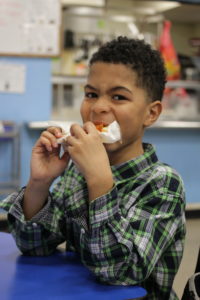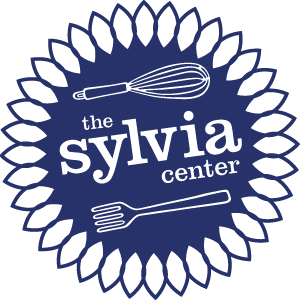This is a featured post from one of our Community Chefs, Kat Hernandez.
As we end our Spring cycle, I am filled with gratitude. Teaching with The Sylvia Center has given me some of the most memorable experiences in my life. Alongside a staff of amazing warrior women, who believe in the importance of healthy food for all, I have been able to have an impact on the kids in my own community. I have been able to use all of the skills I have learned in culinary school to teach the next generation of students to be more aware of what they consume, and to think deeper about what healthy food really is.
 As students in my class knead flour and greek yogurt against a stainless steel surface, I watch as their eyes open with amazement. “Yogurt in pizza dough?” one of them says. I ask them to be patient and open-minded as we continue the recipe. When the pizza was finally served, I watched again as their eyes widened, surprised by how vegetables and yogurt in pizza actually tasted good. Throughout this cycle of classes, my students and I have shared many moments like this one. As the weeks flew by, I watched as their palates, knife skills, and vocabulary shifted—I was amazed.
As students in my class knead flour and greek yogurt against a stainless steel surface, I watch as their eyes open with amazement. “Yogurt in pizza dough?” one of them says. I ask them to be patient and open-minded as we continue the recipe. When the pizza was finally served, I watched again as their eyes widened, surprised by how vegetables and yogurt in pizza actually tasted good. Throughout this cycle of classes, my students and I have shared many moments like this one. As the weeks flew by, I watched as their palates, knife skills, and vocabulary shifted—I was amazed.
Growing up in the same communities as my students, I was, unfortunately, not exposed to cooking programs like those provided by The Sylvia Center. It wasn’t until my early twenties that I began really learning about cooking, seasonal recipes, and that healthy food isn’t always outside my food budget. As my food knowledge grew, I always thought to myself, “I wish I had known this earlier.”
When I walk into the kitchen and begin buttoning up my chef coat, I keep this thought in mind. I understand that the younger we expose children to healthy food choices, the more likely they are to live healthier lives. And, hopefully, not endure obesity, and other preventable diseases that, unfortunately, many children endure because of diet-related issues. I teach with a fire within because I understand that I need to utilize the 3 hours that I have (per class) with my students as wisely as possible, so that the class is fun, educational, and demanding.
My students this cycle learned how to make so many different kinds of foods: soba noodles, frittata, fresh pasta, pizza from scratch, pico de gallo, crostini, crepes, and more — incorporating healthy spins on all of these dishes. In every class, we explored new flavors andoods some of their classmates may have never been exposed to.
I smile because it’s a reminder that kids want to learn how to cook, eat healthy, and collaborate with their peers in the process. It’s all about creating the right environments for them to learn and be their best selves.
I end this cycle strong, hoping, praying, my students apply what they learn in class when they go home and have conversations with their families about healthy food.
Chef Kat Hernandez is an Afro-Latina writer and educator based in Brooklyn, New York. In culinary school, she won a scholarship from the Hispanic Association for Colleges and Universities to develop a culinary portfolio alongside an award-winning pastry chef and studied food history, culture, and media in Italy. Katherine has a B.A. in Food Journalism through the CUNY Baccalaureate for Interdisciplinary Studies program and is now pursuing an M.A. in Journalism at The CUNY Graduate School of Journalism. She was recently a Feet in 2 Worlds food reporting fellow covering stories about immigrants and food in NYC. Her work has been published in The Salt: NPR, PRI’s The World, Edible Manhattan, Harlem Focus and more. Alongside her journalism work, she is also a chef instructor who teaches kids in low-income communities how to be healthier. She truly believes you can’t write or talk about food without talking about health.
Katherine became a chef with The Sylvia Center because she truly believes teaching kids about healthy food through demonstration is the influencing factor that may change their perspective on what it means to eat healthily and how easy it is to do so. She truly believes food is life, and if we teach the next generations on how to make better food choices we can continue in some way to sustain healthy lives.


